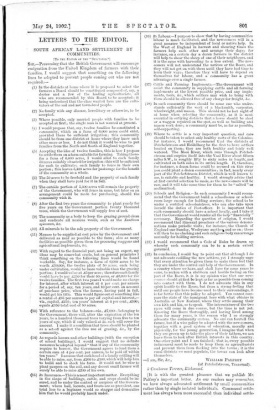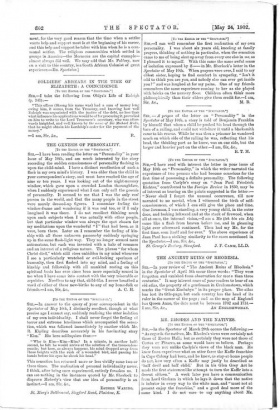LETTERS TO THE EDITOR.
' SOUTH AFRICAN LAND SETTLEMENT BY COMMUNITIES.
pro THE EDITOR Or THE " SPECTATOR:1
Siu,—Presuming that the British Government will encourage ' emigration from the United Kingdom of farmers with their families, I would suggest that something on the following lines be adopted to prevent people coming out who are not required :—
(1) In the districts at home where it is proposed to select the farmers a Board should be constituted composed of, say, a doctor and a few of the leading agriculturists, all who are recommended by this Board to be accepted ; it being understood that the class wanted here are the culti- vators of the soil and not town-bred people.
(2) No family with any disease, hereditary or otherwise, to be accepted.
(3) Where possible, only married people with families to be accepted at first; the single man is not wanted at present.
(4) I would propose that, say, twelve families be constituted a community, which on a farm of 6,000 acres could exist, provided there be sufficient irrigation ; this community should be from one district at home where they know each other more or less. I do not think it would be wise to put families from the North and South of England together.
Accepting the idea of twelve families, this is how I propose to settle them on a farm suitable for farming. Taking there- for a farm of 6,000 acres, I would allot to each family 50 acres suitably situated for irrigation; this will be sufficient for each to cultivate ; each family to fence in their own portion; this leaves 5,400 acres for pasturage for the benefit of the community as a whole.
The 50 acres to be freehold and the property of each family when they shall have paid for it in full.
The outside portion of 6,400 acres will remain the property of the Government, who will fence in same, but later on an arrangement could be made for purchasing, should the community wish it.
After the first two years the community to plant yearly for five years on the Government portion twenty thousand trees, which the Government will supply free of cost.
The community as a body to keep the grazing ground clean and eradicate all noxious weeds, such as the Xanthurn spinosunk, &e.
k10) All minerals to be the sole property of the Government.
(11) Manure to be supplied at cost price by the Government and delivered as near as possible to the farm ; also as many facilities as possible given them for procuring waggons and agricultural implements, Sze.
(12) With regard to the financial part, not being an expert, my ideas may be somewhat crude, but on general principles I think something on the following lines would be found workable. Say, for instance, a farm of 6,000 acres to be worth £10,000, the twelve plots of 50 acres, each being under cultivation, would be more valuable than the grazing portion ; I would value at 25 per acre ; therefore each family would have to par 2250 for their 60 acres, or £3,000 for the twelve families. The first two years I would make no charge for interest, after which interest at 4 per cent, per annum for a period of, say, ten years, and 10 per cent, on account of purchase price, when the farmer, having paid in full, would get his title. This would figure out at something like a rental of.233 per annum to pay off capital and interest,— viz., capital, £250; ten years' interest at 4 per cent., £100; equals 2350 total cost of 50 acres.
(13) With reference to the balance—viz., 21,000—belonging to the Government, there will, after the expiration of the ten years, be a hundred thousand trees varying from five to ten years of age, which if only valued at 2s. each will cover the amount. I make it a condition that trees should be planted as a set-off against the free use of grazing, &c., by the community.
(14) As regards houses and other buildings (with the exception of school buildings), I would suggest that no definite measures be adopted beyond "that if any of the community require to borrow, the Government agrees to lend them a certain sum at 4 per cent. per annum, to be paid off within ten years." I assume that each head of a family settling will be able to raise, say, from 2200 to 2500, which will help him to build and to stock his farm. It would not be wise to plant paupers on the soil, and any decent small farmer will surely be able to raise £200 of his own.
(15) Re Insurance.—This is a most important matter. Everything in the shape of buildings, cattle, and crops should be in- sured, and be under the control or auspices of the Govern- ment; where hail, locusts, and frosts are so prevalent, one total loss to a beginner would so stagger and demoralise hira that he would probably knock under.
(16) Re Labour,—I purpose to show that by having communities labour is much facilitated, and the new-comers will in a great measure be independent of local or native help. In the West of England in harvest and shearing times the farmers help each other and arrange their days; for instance, on a certain day a dozen farmers in the district will help to shear the sheep of one of their neighbours, and it is the same with harvesting to a less extent. The new- comers will not understand the natives or the Boers, and they will not get on with them until they have had time to learn their ways; therefore they will have to depend on themselves for labour, and a community has a great advantage over a single farmer.
(17) Cattle and Farming Implements.—The Government will assist the community in supplying cattle and all farming implements at the lowest possible price, and any imple- ments, tools, &c., which settlers may wish to bring with them should be allowed free of any charge for freight, &e.
(18) In each community there should be some one who under- stands sufficiently the work of a blacksmith, carpenter, wheelwright, and mason. This should not be lost sight of at home when selecting the community, as it is most essential in outlying districts that a horse should be shod or a waggon repaired on the spot, as well as building and mason work done; a community must be, as far as possible, self-supporting.
(19) Where to settle is a very important question, and care should be taken to select only healthy Darts of the Colonies; for instance, I would recommend Viet the districts of Potchefstroom and Heidelberg be the first to have settlers located on them ; they are both healthy and fairly well watered. The Moth River, which runs through Potchef- stroom and empties itself into the Vaal River about fifteen miles S.W., is roughly fifty to sixty miles in length', and cultivated on both sides in its entire length. It-therefore, for instance, a dozen farms could be secured on this river you could plant a dozen communities ; in fact, nearly every part of the Potchefstroom District, which is well known tc me, is suitable and healthy. I would strongly advise that at first careful selection be made, as the new-corners will be raw, and it will take some time for them to be " salted " or acclimatised.
(20) Schools and Religion.—In each community I would recom- mend that the Government build a schoolhouse or school- room large enough for holding services ; the school to be under a certified schoolmistress, who can also take upon herself the • duties of Post-officer. It is important that each community should have a school locally, and I take it that the Government would render all the help " financially " necessary. Regarding the question of religion, I would recommend that itinerant preachers of the various denomi- nations make periodic visits; for instance, the Church of England one Sunday, Wesleyans anothelk and so on ; there will then be no clashing and each religious body can arrange mutually for holding services.
(21) I would recommend that a Code of Rules be drawn up whereby each community can be to a certain extent governed.
(22) In conclusion, I would beg to point out that although I do not advocate coddling the new settlers, yet I strongly urge that every attention be given them, to make them feel that they are under the control and help of the Government. In a country where we have, and shall have for some years to come, to reckon with a stubborn and hostile feeling on the part of the Boers, it is in my opinion wise that our new- comers should at first be kept as far as possible from coming into contact with them. I do not advocate this in any spirit hostile to the Boers, but from a strong feeling that until our people have become used to their surroundings, it is far better that this policy be adopted. You cannot com- pare the state of the immigrant here with what obtains in Australia or New Zealand, where they settle among their own kith and kin, so to speak. The intermixture of the two races will come in due course, but the time is not yet. Knowing the Boers thoroughly, and having lived among them for many years, is tho reason why I so strongly advocate the community system. No one can foretell the future, but if a wise policy be adopted with the new-comers, together with a good system of education, morally and physically, for the young generation, I imagine that when they are grown up to take the place of their fathers, we can leave them to look after British interests in this country. One other point and I am finished; that is, every possible inducement must be made to keep them as agriculturists and prevent them from flocking into the towns ; it is the rural districts we must populate, the towns can look after themselves.
[It is with the greatest pleasure that we publish Mr. Palfrey's important letter. As our readers may remember, we have always advocated settlement by small communities rather than by single isolated individuals. Communal settle-
ment has always been more successful than individual settle- ment, for the very good reason that the time when a settler wants help and support most is at the beginning of his career, and this help and support he takes with him when he is a com- munal settler. The religious communities which settled in groups in America—the Mormons are the capital example— almost always did well. We may add that Mr. Palfrey, now on a visit to this country, is a South African Colonist of great experience.—En. Spectator.]







































 Previous page
Previous page